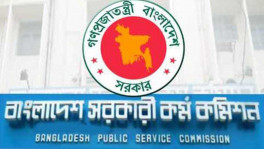Reality under the rug of progress
Nations striving to present their best faces, brushing aside their persistent woes provide a thought-provoking case study of on the portrayal of progress – compelling one to wonder whether the state is really of the people, by the people and for the people

The global stage often witnesses a curious spectacle – nations striving to present their best faces, brushing aside their persistent woes. It is glaringly evident in the recent efforts of two South Asian nations - India and Bangladesh.
They provide a thought-provoking case study of on the portrayal of progress – compelling one to wonder whether the state is really of the people, by the people and for the people.
India, a rapidly growing global economic front-runner, boasts remarkable scientific achievements and rapid economic growth. However, beneath this veneer of prosperity lies one of the highest poverty rates in the world. While India projects itself as a modern economic powerhouse, it still has to grapple with massive underdevelopment and poverty.
During the G20 Summit this year, the host India, gave its capital of New Delhi a facelift. Roads were adorned with water fountains, posters of Indian Prime Minister Narendra Modi, and intricate artistic carvings were meant to impress international visitors. However, hidden behind these grand gestures were the city's slums and impoverished residents, concealed behind towering green curtains.
For instance, the Coolie Camp near Vasant Vihar in Delhi was veiled with a green cloth to shield its impoverished inhabitants from the view of foreign delegates attending the conference.
A CNN report highlighted the case of a slum dweller who, for the past 30 years, had lived on a decrepit pavement next to an open sewage drain opposite the prominent Pragati Maidan complex, where leaders of the G20 nations convened. However, her dwelling, obscured by the green curtain, would not be what US President Joe Biden, French President Emmanuel Macron, or British Prime Minister Rishi Sunak would witness as they arrived for the summit.

This raises a distressing question: Is the nation ashamed of its own people?
The green curtains around Delhi served as a stark reminder of the persistent inequality and poverty that continue to blight Indian society. The grandeur of the summit preparations sought to mask the glaring disparities in income and living standards that persist across the city and the nation.
The attempt to showcase a glossy image of India during the G20 Summit should have prompted reflection on the lives of the poor citizens. Rather than concealing the grim realities of poverty and inequality, India should have confronted them head-on.
On that note, Bangladesh presents a different narrative – but somewhat the same story.

The transformation of Dhanmondi Lake ahead of French President Emmanuel Macron's visit in mid-September offered a glimmer of hope. However, it also exposed the inconsistency in efforts directed towards city cleanliness or rather better to say towards serving the people.
The stark difference between the lake's condition during high-profile visits and its regular state is upsetting. On ordinary days, garbage is scattered across various parts of the lake, with waste, including food packets, plastic bottles, cups, and polythene bags littering its banks and waters. Restaurants and food carts encroach beyond their designated areas, cluttering the environment with chairs and tables.
Surprisingly, the lake marred by filth and pollution was cleaned overnight. This work was carried out by nearly 200 cleaners from Dhaka South City. This much-appreciated cleanup efforts before Macron's visit raises some questions: Why can't such initiatives be taken year-round? Why the cleanliness of a lake should be reserved only for the visits of dignitaries like Emmanuel Macron. Shouldn't the common citizens be entitled to clean and safe cities throughout the entire year?
These concerns extend to other areas like Hatirjheel, the Buriganga riverbanks, and several other parks in Dhaka city, all of which have deteriorated and lost their appeal as places of refreshment for city dwellers.
The two instances from India and Bangladesh shed light on a critical issue: Addressing pressing challenges should not be contingent upon the timing of high-profile events. Instead, it should be an integral part of a nation's identity, reflecting an ongoing commitment to the welfare of its citizens and the preservation of its natural resources.
Both India and Bangladesh are endowed with rich cultural heritages and immense potential. However, their true strengths can only shine when comprehensive, consistent efforts replace selective actions prompted by high-profile events. The focus must shift from temporary facades to the establishment of enduring change. Issues like poverty, environmental preservation, and inequality require continuous attention and intended action.
The juxtaposition of India's G20 summit preparations and Bangladesh's cleanup of Dhanmondi Lake in the context of foreign delegates' visits showcase the juxtaposition between the image projected and the underlying reality.
Mehedi Hasan Marof is journalist at The Business Standard. His X (Twitter) handle is @MehediMarof.



 Keep updated, follow The Business Standard's Google news channel
Keep updated, follow The Business Standard's Google news channel
















